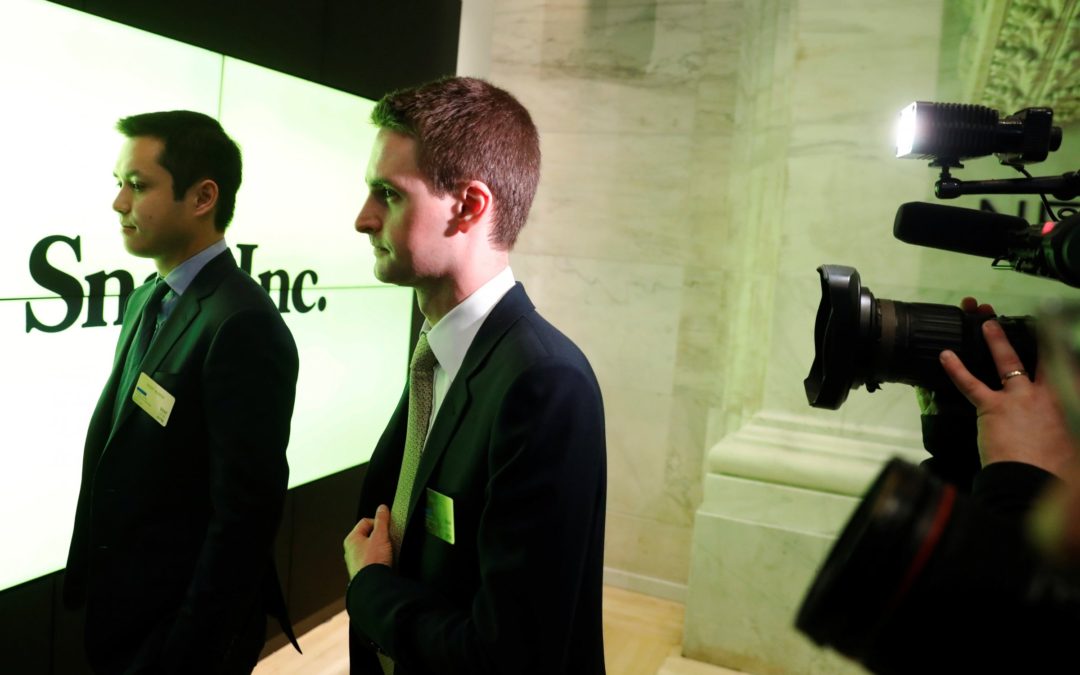
Around the time of Snap’s initial public offering in early March, employees got a rare chance to ask the CEO, Evan Spiegel, anything on their minds.
Unlike the “town hall” meetings at Google, Facebook, and other tech companies, the Q&A at Snap was a written affair. Using a shared document, employees submitted questions to the company’s 27-year-old leader.
The result revealed a common anxiety: About one dozen of the questions were a variation of whether employees should worry about Snapchat’s competitors, particularly Facebook and Instagram, which appeared to be crimping Snapchat’s rapid growth.
Spiegel’s responses were short, and the one-word answer “no” was all that was written next to some of the queries, according to multiple people with knowledge of the document. Other answers of Spiegel’s explained how employees should not think about the competition and should instead focus on delivering the best products and on innovating.
Five months later, the nervousness percolating within Snap has not gone away. It has spread beyond the company’s Southern California headquarters and rattled investors. Snap has lost billions of dollars in value and the stock is trading 50% below the peak it reached on its first day of trading. In the coming days, the window for employees and insiders to sell their shares will finally open, presenting an important test of confidence in the company.
Snap has already changed in many ways in its short life as a publicly traded company: Q&As with Spiegel are more frequent, new products are tested in ever smaller and more secretive circles, early executives have been quietly replaced, and headcount has grown.
But one thing that hasn’t changed is that Snap remains an Evan Spiegel project. His centralized, unfettered control has made Snapchat the millennial generation’s preferred hub for communication and entertainment. The question now is whether the company has outgrown the arrangement.
Business Insider spoke with former and current employees along with people close to Snap to understand Spiegel’s leadership in the face of fierce competition and to shed light on the secretive, contrarian culture that has come to define the company.

Reuters
As many as 1.2 billion Snap shares owned by early investors, employees, and insiders will be available for sale on the public market in the coming weeks, when the post IPO lock-up on insider selling is lifted. The first batch, 400 million shares owned by early investors, will be eligible for trading on Monday.
Mindful of the big change for employees as Snap evolves from startup to public corporation, Snap has taken steps to manage the transition.
The company held multiple seminars for employees in the run-up to its IPO, covering the basics of what it means to be a public stockholder, like not revealing insider information or shorting stocks, according to people familiar with the matter. Professors from Stanford University were also enlisted to coach the company’s soon-to-be millionaires on how to manage their wealth.
Even in its hometown of Venice Beach, Snap strives to keep a low profile and to maintain a sense of normalcy.
The company recently bought a small fleet of custom bikes for its employees to ride between meetings. The bikes were originally going to be bright yellow, but Snap ultimately decided to make them black instead.
“They didn’t want to have their employees singled out,” Solé Bicycle co-owner Jimmy Standley, who designed the bikes, told BI.
Snap declined to comment for this story.
While fascination with the stock price is a natural symptom experienced by employees at any newly public company, Spiegel has sought to downplay stock-watching as a pointless distraction. In another written Q&A to staff, Spiegel warned employees to not pay attention to the stock price, cautioning them that it would ebb and flow. The time would be better spent, he said, focusing on creating innovative products.
‘No one knows what’s inside his head’

Getty
The power and respect you possess within Snap is largely determined by one factor: How close you can get to the sun.
And the sun is Evan Spiegel.
Because of how he has structured the organization into siloed groups that rarely interact with each other, only Spiegel, his most senior executives, and…

